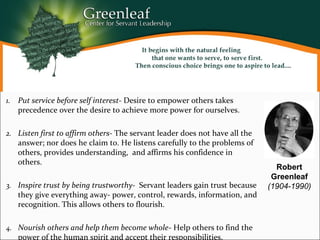Servant leadership
- 1. Helping those we are responsible for to reach their fullest potential
- 2. 1. Put service before self interest- Desire to empower others takes precedence over the desire to achieve more power for ourselves. 2. Listen first to affirm others- The servant leader does not have all the answer; nor does he claim to. He listens carefully to the problems of others, provides understanding, and affirms his confidence in others. 3. Inspire trust by being trustworthy- Servant leaders gain trust because they give everything away- power, control, rewards, information, and recognition. This allows others to flourish. 4. Nourish others and help them become whole- Help others to find the power of the human spirit and accept their responsibilities. Robert Greenleaf (1904-1990)
- 3. The Servant by James C. Hunter •Transcends self-interest •Inspirational •Help others grow •Provide opportunity •Encouraging others •Foster understanding •“Leading on behalf of” & “for the sake of”…his/her followers •Servant leadership is essentially leadership upside-down (according to the old paradigm)
- 4. Maslow’s needs vs. Hunter’s leadership model Abraham Maslow’s Hierarchy of Human Needs James Hunter’s Servant Leadership Model
- 6. Archbishop Desmond Tutu (1984 Nobel Peace Prize) South African activist and Christian cleric and an opponent of apartheid. He was the first black South African Archbishop of Cape Town, South Africa. Archbishop Tutu actively defends human rights and has campaigned to fight: AIDS, tuberculosis, homophobia, poverty, and racism. Tutu received the Nobel Peace Prize in 1984, the Albert Schweitzer Prize for Humanitarianism in 1986, the Gandhi Peace Prize in 2005, and the Presidential Medal of Freedom in 2009.
- 7. What others have to say about servant leadership… Steven R. Covey, from The Principle-Centered Leader, says, “If our intent is to serve, to bless others without self concern, we are inwardly rewarded with increased internal security and an abundance mentality.” Robert Wood Johnson, of Johnson & Johnson, says, “It is the duty of the leader to be a servant to those responsible to him.” Jesus Christ says in Matthew 20:26-28 “…Whoever wants to be a leader among you must be your servant, and whoever wants to be first among you must become your slave. For even the Son of Man came not to be served, but to serve others and to give his life as a ransom for many.”
- 8. Email: kyle_n_coffey@yahoo.com Electronic copy of this presentation can be found at: www.slideshare.net/kylencoffey







